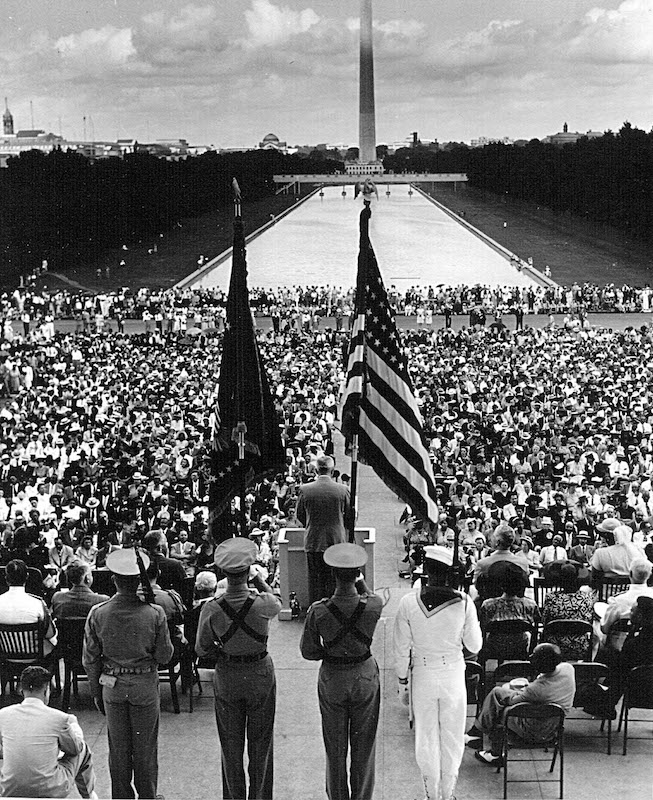
Cleveland—the site of next week’s Republican Party National Convention—isn’t the only Ohio city playing host this month to a large and significant gathering. Starting Saturday, Cincinnati will be host to the annual convention of the National Association for the Advancement of Colored People (NAACP).
This year’s convention has the theme of “Our Lives Matter. Our Votes Count.” But, says Mildred Roxborough, this year’s event will hardly be the first time the largest and oldest civil rights organization has emphasized that message—and she would know. Roxborough, special assistant to the NAACP and the longest-standing member of the organization, will have attended more than half of all 107 conventions the NAACP has held since its founding in 1909.
Roxborough, who was born in 1926, is known for her wide knowledge of the organization’s history. She has been dutifully present for some of the annual event’s most melancholy moments—like the convention in 1963, after Medgar Evers was killed, which she identifies as a point of great historical import—and some its most touching, like when President Barack Obama addressed the organization for its centennial in 2009.
Roxborough started her advocacy with the NAACP when she was about 9 years old, by selling the organization’s official publication The Crisis, and began her official work with the organization as a field secretary in 1954—when she attended her first conference—working closely with Evers, a field representative, in Mississippi.
“Lynchings were common, rigid segregation, assaults on blacks for varieties of reasons and the denial of access to certain kinds of employment and public accommodations … These are the kinds of issues of which were incorporated into an NAACP convention program agenda,” says Roxborough. “Just as they are this year, with our theme.”
A little more than a decade after Roxborough began her work, Evers would be assassinated in Mississippi, just weeks before the 1963 NAACP convention in Chicago. The emotional address delivered at the convention by his widow, Myrlie, is “etched in my memory very sharply,” Roxborough tells TIME.
Get your history fix in one place: sign up for the weekly TIME History newsletter
The road to this year’s convention, and every one preceding it for the past century, began with a call to action following lynchings and race riots in Springfield, Ill., in 1908. Horrified, a group of activists, including the descendants of abolitionists, called for a meeting to discuss solutions to the violence, gaining the support of W.E.B. DuBois, and Ida B. Wells-Barnett, among others. The group’s stated goals—to secure the rights guaranteed in the 13th, 14th and 15th Amendments to the U.S. Constitution—had already been achieved in theory, but would take mountainous legal fights and dedicated lobbying to achieve in practice.
The first convention to discuss those goals was held in the summer of 1909 at the Cooper Union in New York City, Roxborough says. Such meetings would soon become a part of the organization’s annual agenda, meant to celebrate victories, set goals for the future, address obstacles and provide training.
Also notable about the history of the convention, Roxborough says, is its long tradition of inviting U.S. presidents and presidential candidates to address the NAACP members and delegates. According to the Library of Congress, Harry Truman became the first president to address the convention in its 38 years of history when he spoke from the steps of the Lincoln Memorial in June 1947, demanding that the federal government take the lead in guaranteeing civil rights. Roxborough adds that the politicians are “treated politely,” even if they’re disagreed with by the members of the NAACP.
Per tradition, the NAACP has invited both presumed presidential candidates, Democrat Hillary Clinton and Republican Donald Trump, to address the convention, though Trump declined the invitation. Hillary Clinton is expected to speak on Monday.
“It’ll be a good convention,” Roxborough says with a laugh. “You’re talking to someone that has been to more conventions than they should have been.”
More Must-Reads from TIME
- Cybersecurity Experts Are Sounding the Alarm on DOGE
- Meet the 2025 Women of the Year
- The Harsh Truth About Disability Inclusion
- Why Do More Young Adults Have Cancer?
- Colman Domingo Leads With Radical Love
- How to Get Better at Doing Things Alone
- Michelle Zauner Stares Down the Darkness
Contact us at letters@time.com